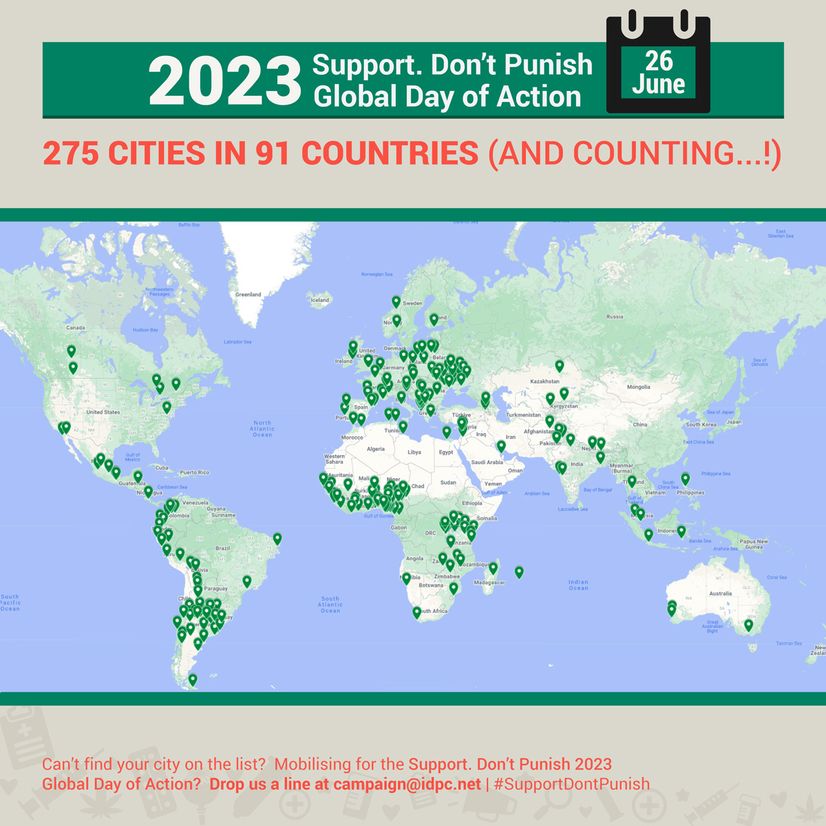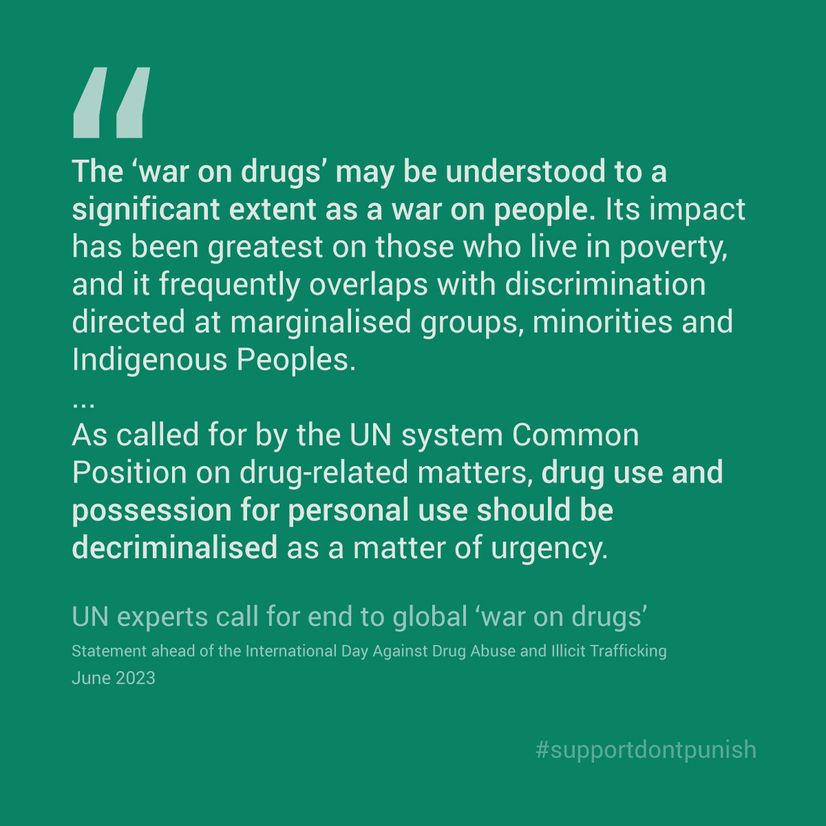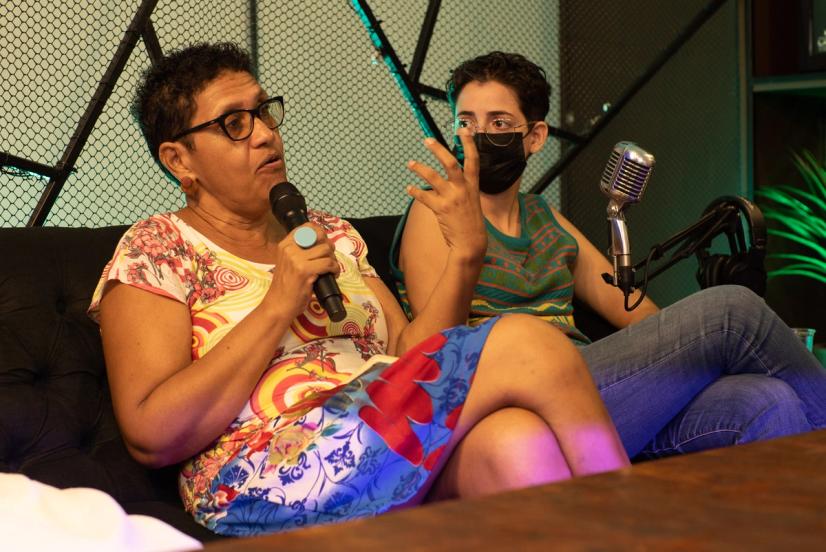Fourate Chahal
Support. Don’t Punish 2023: Cultivating ecosystems of change for a future beyond the ‘war on drugs’
The 2023 Support. Don’t Punish Global Day of Action, on the 26th of June, will once again reach all corners of the world with a call for approaches to drugs that centre respect, solidarity, health and rights, rather than violence and punishment. From conversations on harm reduction and bodily autonomy over salsa tunes in Peru; to a running event led by community leaders in Uganda; a multi-city flash mob campaign highlighting the needs of people who use drugs amidst the war in Ukraine; and through to a week-long series of events on alternatives to ‘zero tolerance’ in Singapore, the day will be brimming with the creativity and determination of thousands of campaigners committed to building a world where everyone in our communities can belong and thrive.
The 2023 edition builds on over a decade of sustained efforts, with a wide range of achievements and impacts already secured. In Colombia, the campaign has been instrumental in resourcing local partners’ push to enshrine harm reduction into legislation and mainstream it in the media and policy priorities of local governments (including the country’s capital). In Mauritius, campaigners’ years-long advocacy to end the criminalisation of people who use drugs paved the way for the government to depenalise possession for personal use in 2022. In Malaysia, local partners have ensured the current government’s stated commitment to include decriminalisation in amendments to the country’s 70-year-old drug laws. In Ivory Coast, the campaign has elevated demands for the implementation and scale up of harm reduction interventions, contributing to the opening of the first needle-and-syringe programme (NSP) in the country. These, and many more examples, speak to the importance of cultivating our movement’s grassroots and promoting an ecosystem of change capable of reclaiming power and demanding the change our communities need.
Such shifts in policies and attitudes have not only taken place at the national level. Internationally, our collective efforts are changing the terms of the debate. UN entities are now mandated to speak with one voice on the importance of decriminalisation, as stated in the UN System Common Position on Drugs. The Global AIDS Strategy 2021-2026 includes the most ambitious international commitments in terms of policy reform (including decriminalisation) and community leadership ever agreed upon at the global level. Similarly, last year on the 10th anniversary of the campaign, and once again this year, UN human rights experts issued groundbreaking statements calling for an end to the ‘war on drugs’, and to ‘replace punishment with support’ —in a clear reference to the campaign’s motto. Today, the key messages from the UN’s own World Drug Report - in amongst the usual narratives around growing drug markets - highlights that 'access to evidence-informed treatment and HIV and Hepatitis services must be stepped up' and 'public health must remain the priority'.
While our cause inches forward and progress should be celebrated, we must remain vigilant and persistent —change is not linear and pending challenges are formidable. Globally, people who inject drugs are still 35 times more likely to acquire HIV, reflecting the violence and neglect to which people who use drugs are exposed. Despite explicit commitments, the international community is not walking the talk when it comes to promoting harm reduction and ending punishment. Less than 50% of countries implement the most basic harm reduction interventions and even those who do rarely do so at the required standard. As a result, fewer than 1% of people who inject drugs live in countries with adequate coverage of these lifesaving interventions. Similarly, despite some form of decriminalisation being in place in about 38 countries, most existing models leave vast swathes of the population behind —maintaining punishment for the many. In addition, the ‘war on drugs’ rages on with particular brutality in many corners of the world, weaponised to crush nonconformity and dissent, pushing hundreds of thousands into premature death, and targeting populations who are already in the crosshairs of multiple forms of vulnerability and exclusion, including poverty, racism, patriarchal violence, ableism and serophobia, just to name a few.
This mixed picture reminds us of the importance of intensifying our efforts and collective capacity to bring about sustainable, meaningful change. Fortunately, we can be inspired by the over 2,000 activities that Support. Don’t Punish local partners have organised over the past decade to move the needle forward. While this treasure trove of campaigning experiences offers many lessons, we want to highlight three:
Firstly, on the importance of intersectionality and cross-movement solidarity. As US freedom fighter Audre Lorde said: ‘There is no such thing as a single-issue struggle because we do not live single-issue lives’. Having this in mind, we must become proactive in building bridges not only with communities disproportionately harmed by the drug war, but with struggles for justice and liberation more broadly. Support. Don’t Punish campaigners have made strides in this direction. In 2022, for instance, the Free School of Harm Reduction (Brazil) held a fruitful debate with activists from feminist movements to unpack the way racism, misogyny and classism are interwoven into the fabric of the ‘war on drugs’, perpetuating cycles of exclusion and incarceration. In a similar way, this year in Kenya, a collaboration between Women Nest, BHESP and KiNPUD will conduct dialogues with decisionmakers and community leaders on how the criminalisation of drug use and sex work push hundreds into harm and premature death —underscoring the importance of ending stigma and decriminalising these activities. These connections strengthen our movement and set the foundations of a common front against injustice and oppression.
Secondly, on the value of experimentation. Building sustainable alternatives to the ‘war on drugs’ requires more than changing laws. We need to question and rethink the way we exist with each other —and, in particular, with people currently pushed to the margins. Which is why the Support. Don’t Punish campaign has a rich and proud record of resourcing projects that not only seek to reform drug policies but also create connections and awaken empathy and solidarity in the community. While we can draw inspiration from uplifting examples from around the world, grounding them in our contexts in ways that respond to local experiences and needs will require experimentation. As such, the campaign is galvanised by the way local partners courageously flip the script and come up with innovative ideas to effect influence and change. Last year, for example, the campaign’s Initiatives Programme awarded a project by Teens Link Uganda through which young advocates from key populations used the PhotoVoice methodology to strengthen community bonds, document their lived experiences, and produce compelling images and narratives that went on to be repurposed for policy advocacy. Similarly, before the invasion of Ukraine made it impossible, colleagues from the Ukrainian Network of People who Use Drugs (PUD.UA / VOLNA) and allies staged yearly street theatre performances in front of the President’s office that represented the challenges that people who use drugs faced in relation to the public health and criminal legal systems —attracting the attention of passers-by and decisionmakers. Some of these experiments may not lead to the expected outcomes, but the lessons learnt from them are precious and can lead us to hone our campaigning and advocacy in the longer term.
Finally, on the power of grassroots initiatives and the question of funding. Many Support. Don’t Punish local partners mobilise on a dime. A significant number of them are community-led groups and networks that, despite their expertise and irreplaceable insight, are rarely financially supported by local and national authorities. Whilst recognising the value of volunteer work, which is the lifeblood of any grassroots movement, there is an urgent need to channel support toward our movement and its grassroots. As the central hub of the campaign, the International Drug Policy Consortium is incredibly grateful to the Elton John AIDS Foundation, the Robert Carr Fund and the Open Society Foundations for their invaluable, long-term contributions to the campaign, which enable us to support over 100 groups worldwide every year. And yet increasingly we are forced to make difficult financing decisions as the demand to organise under the Support. Don’t Punish banner far exceeds our resources and those of the campaign’s ‘sister hubs’. Government funding as well as international and private donors are direly needed by this growing movement; not only to move the goalposts forward but also to resist ongoing backlash and crackdowns.
All of the above speaks to the importance of cultivating ‘ecosystems of change’ —mass movements with multiple partners working in coordination through diverse strategies and tactics to reclaim power for our communities and effectively demand the change that we need. The Support. Don’t Punish Global Day of Action is our biggest annual collective offering in this direction.




